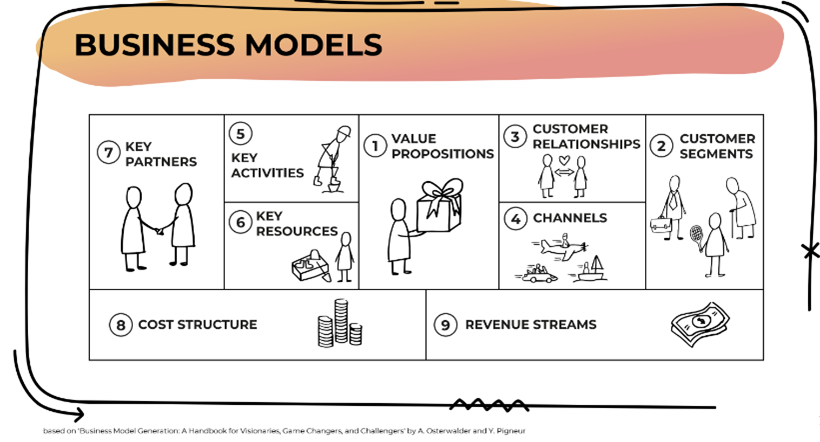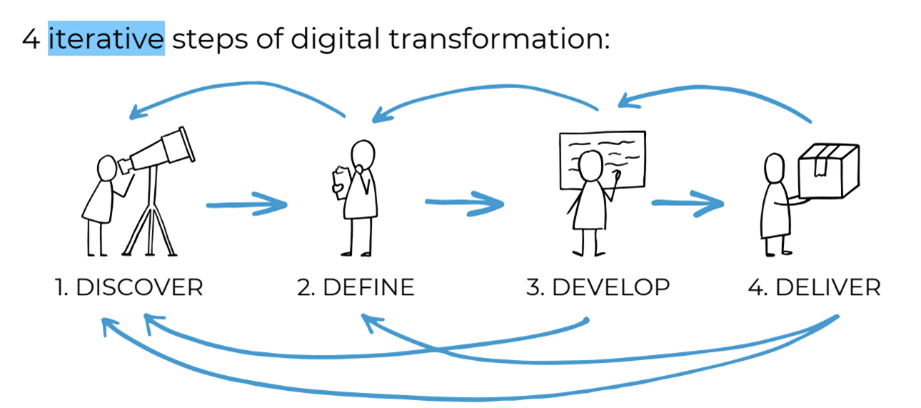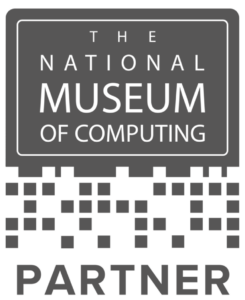Digital Transformation has become a critical element in the survival and growth of organisations. It’s no longer just a trendy buzzword but an essential step that companies need to take to meet the evolving needs of the market and customers. In the era of the fourth industrial revolution, technologies like artificial intelligence, cloud computing, and the Internet of Things (IoT) are forming the backbone of modern businesses.

However, Digital Transformation is not just about implementing new technologies – it’s about a comprehensive change in our business model, processes, and organisational culture, enabling the effective use of technology to achieve strategic goals.
It’s worth noting that numerous studies indicate that Digital Transformation efforts often fail. For example KPMG’s 2023 Global Tech Report[1]indicates that, although investments in digital technologies are increasing, only 30% of companies consider their transformation projects to be fully successful. The main barriers are the lack of a clear vision and difficulties in integrating new technologies with existing systems. Transformation should be a well-thought-out and comprehensive process that leads to creating a new digital business model, not just enhancing existing processes.
For innovative companies, Digital Transformation also means evolution in the role of IT. IT departments, previously seen primarily as technical support, are now becoming strategic partners for business, actively involved in decision-making and co-creating the company’s vision. This shift is particularly evident in traditional sectors not built on technology, where IT has evolved from a support role into an active participant in managing the organisation.
WHAT ARE THE KEY STEPS TO IMPLEMENT DIGITAL TRANSFORMATION?
The Digital Transformation process should be divided into four fundamental steps, which help organisations implement comprehensive changes in an organised and effective way:
1. Discover
In the first step, discover, the focus is on gaining a complete understanding of the organisation and its environment. This stage involves identifying both challenges and opportunities – whether they are technological, process-related, or cultural. We conduct a thorough analysis of the current situation, verifying market trends, analysing the sector, potential competitors, technological and consumer trends, and exploring new market opportunities. It is also a moment for conversations with key stakeholders to gain a holistic picture of the company. Without a deep analysis at this stage, building a solid transformation plan is impossible – to change something, we first need to understand how it currently works.
2. Define
In the define stage, we define the vision and start crafting the new digital business model for the organisation. This is when we ask ourselves what the organisation should become – what the strategy should be, where we want to head with the transformation, and what our vision for this change is. We also define what the business model should look like to address those goals.

This stage is about setting high-level objectives and strategic directions, determining what kind of value we want to deliver to our customers. It’s important to establish a vision that will serve as a foundation for future steps and motivate the team to act.
3. Develop
The develop stage translates the vision into specific, actionable solutions. Here, we decompose it into implementation phases, known as horizons, which allow for achieving quick wins and building momentum and engagement in the transformation journey. New processes, structures, and technologies are introduced to support organisational goals. At this stage, we determine which specific tools and technologies will best support our vision and what changes are necessary to deliver the intended outcomes.
4. Deliver
The final step, deliver, is about implementing the developed solutions. Actions are divided into programmes and projects that are executed by teams and embedded in the organisation. Implementing new processes, tools, and structures requires effective change management so that IT and other departments can adapt smoothly to the new reality. New technology must be integrated with proper change management for people, culture, and processes. The goal is to improve the effectiveness of the entire organisation.

Throughout this process, an iterative approach is crucial, involving testing solutions and being flexible enough to adjust as conditions change. We are living in times of exponential technological growth, and it’s important to continuously monitor whether our chosen directions are still appropriate for our business.
THE ROLE OF ITSM IN DIGITAL TRANSFORMATION
In Digital Transformation ITSM plays a vital role, acting as an integral part of the transformation process and requiring careful attention during the initial analysis of the organisation’s capabilities. During the discover step, several ITSM challenges often emerge:
- Lack of key ITSM elements. Many companies that have grown organically have not developed certain ITSM functions that are critical today. Without well-developed IT services, it is difficult to fully support the entire organisation.
- Inefficient process placement. As organisations grow, IT grows along with them, and processes are often positioned randomly. This leads to an inefficient IT structure with dispersed and suboptimal operations. In many cases, this means building an entirely new process framework, followed by a new IT structure and operational model to support these processes effectively.
- Low maturity of certain IT areas. Different parts of the IT department evolve at different rates. Some areas are well-developed, while others need significant changes and optimisation. Identifying these gaps is key to effectively support the organisation’s transformation goals. It is also worth considering automation and implementing ITSM tools that can support the organisation more efficiently.
ITSM is therefore one of the areas that may need restructuring during the digital transformation process to better support the new digital business model and strategy of the organisation.
DIGITAL TRANSFORMATION AS A CAREER PATH FOR IT LEADERS
Digital Transformation also presents a significant growth opportunity for IT leaders. As part of their new role, IT leaders can enhance their skills in strategic management, vision building, and leading major organisational changes. Digital Transformation offers them the opportunity to rise to the boardroom, actively influencing the organisation’s future direction.
CONCLUSION
Implementing Dgital Tansformation is a complex process that requires careful preparation, clear goals, and the involvement of the entire organisation. The key steps of the transformation process are discover, define, develop, and deliver. ITSM plays an important role here, supporting IT management within the new digital operational model. Digital Transformation is also a career opportunity for IT leaders, allowing them to support their organisation’s journey toward digital maturity.
We invite you to take part in Digital Transformation Foundation training, which provides participants with the essential tools and knowledge needed to successfully lead transformation efforts within their organisations.
[1] KPMG Global Tech Report https://kpmg.com/xx/en/our-insights/ai-and-technology/kpmg-global-tech-report-2023.html (2023); 08.10.2024



